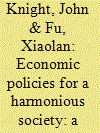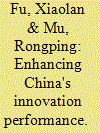| Srl | Item |
| 1 |
ID:
130977


|
|
|
|
|
| Publication |
2014.
|
| Summary/Abstract |
China's remarkable economic growth has produced dramatic structural and socioeconomic change.
Economic growth has solved many problems but the accompanying changes in the economy and
society have brought new problems to the fore. This has been recognized by China's Government
in the recent emphasis that it has placed on the need to create a "harmonious society." The new
leadership will wish to devise new policies for the current challenges and those ahead
|
|
|
|
|
|
|
|
|
|
|
|
|
|
|
|
| 2 |
ID:
130980


|
|
|
|
|
| Publication |
2014.
|
| Summary/Abstract |
Transforming China into an innovation-driven economy has been one of the top priorities of the Chinese Government. This paper examines the policy choices involved in the extended national innovation performance framework for creating an open innovation system. Innovation capabilities, incentives and institutional frameworks are examined. The paper argues that China should continue to increase its investment in R&D and in education, and that there should also be an attempt to strengthen the incentive system at the macro, meso and micro levels. This strengthening may include reforms to: release the power of competition and guide resources towards innovative sectors; adopt appropriate human resource management, such as appraisal and remuneration systems; create effective policies for research funding management; and evaluate the efficiency of research to encourage the creativity of researchers, managers and employees. The paper also discusses the space for industrial policy in the 21st century.
|
|
|
|
|
|
|
|
|
|
|
|
|
|
|
|
| 3 |
ID:
108129


|
|
|
|
|
| Publication |
2011.
|
| Summary/Abstract |
This paper provides an analysis of the relative significance of various methods of acquiring tacit knowledge within the Chinese optical fibre and cable industry. The paper contributes to the definition, understanding and investigation of tacit knowledge using firm-level data in a developing country context, helping to complete a gap in the existing broader literature on technological learning. The research suggests that in industries where tacit knowledge is a more important component of technological learning than codified knowledge, internal R&D activities and domestic peers are important knowledge sources. Additionally, universities are shown to be an important asset in creating learning organisations and provide effective knowledge sources of both tacit and codified knowledge. However, imports of equipment and licensing are a less effective learning channel in the acquisition of tacit foreign technology.
|
|
|
|
|
|
|
|
|
|
|
|
|
|
|
|
| 4 |
ID:
108125


|
|
|
|
|
| Publication |
2011.
|
| Summary/Abstract |
In recent years China and India have achieved tremendous technological progress and development in the solar photovoltaic (PV) industry. Using case studies, this paper analyses and compares the technology progress in the solar PV industry in China and India, and discusses the role national innovation systems played in sustaining technology acquisition, adaptation and development. It illustrates that both countries adopted a strategy of mixing and sequencing different technology transfer and indigenous innovation mechanisms. The experience of both countries also suggests that a functional national environmental innovation system is important in sustaining and advancing technology acquisition, adaptation and development. This paper provides an alternative pathway for developing countries to follow in catching up with developed countries in the emergent green industries and in leapfrogging towards an internationally competitive green economy.
|
|
|
|
|
|
|
|
|
|
|
|
|
|
|
|